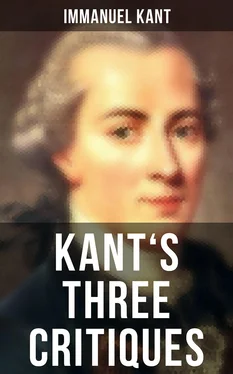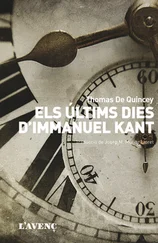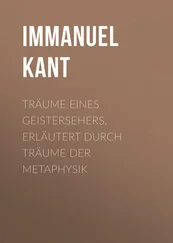It is not at present our business to treat of empirical illusory appearance (for example, optical illusion), which occurs in the empirical application of otherwise correct rules of the understanding, and in which the judgement is misled by the influence of imagination. Our purpose is to speak of transcendental illusory appearance, which influences principles — that are not even applied to experience, for in this case we should possess a sure test of their correctness — but which leads us, in disregard of all the warnings of criticism, completely beyond the empirical employment of the categories and deludes us with the chimera of an extension of the sphere of the pure understanding. We shall term those principles the application of which is confined entirely within the limits of possible experience, immanent; those, on the other hand, which transgress these limits, we shall call transcendent principles. But by these latter I do not understand principles of the transcendental use or misuse of the categories, which is in reality a mere fault of the judgement when not under due restraint from criticism, and therefore not paying sufficient attention to the limits of the sphere in which the pure understanding is allowed to exercise its functions; but real principles which exhort us to break down all those barriers, and to lay claim to a perfectly new field of cognition, which recognizes no line of demarcation. Thus transcendental and transcendent are not identical terms. The principles of the pure understanding, which we have already propounded, ought to be of empirical and not of transcendental use, that is, they are not applicable to any object beyond the sphere of experience. A principle which removes these limits, nay, which authorizes us to overstep them, is called transcendent. If our criticism can succeed in exposing the illusion in these pretended principles, those which are limited in their employment to the sphere of experience may be called, in opposition to the others, immanent principles of the pure understanding.
Logical illusion, which consists merely in the imitation of the form of reason (the illusion in sophistical syllogisms), arises entirely from a want of due attention to logical rules. So soon as the attention is awakened to the case before us, this illusion totally disappears. Transcendental illusion, on the contrary, does not cease to exist, even after it has been exposed, and its nothingness clearly perceived by means of transcendental criticism. Take, for example, the illusion in the proposition: “The world must have a beginning in time.” The cause of this is as follows. In our reason, subjectively considered as a faculty of human cognition, there exist fundamental rules and maxims of its exercise, which have completely the appearance of objective principles. Now from this cause it happens that the subjective necessity of a certain connection of our conceptions, is regarded as an objective necessity of the determination of things in themselves. This illusion it is impossible to avoid, just as we cannot avoid perceiving that the sea appears to be higher at a distance than it is near the shore, because we see the former by means of higher rays than the latter, or, which is a still stronger case, as even the astronomer cannot prevent himself from seeing the moon larger at its rising than some time afterwards, although he is not deceived by this illusion.
Transcendental dialectic will therefore content itself with exposing the illusory appearance in transcendental judgements, and guarding us against it; but to make it, as in the case of logical illusion, entirely disappear and cease to be illusion is utterly beyond its power. For we have here to do with a natural and unavoidable illusion, which rests upon subjective principles and imposes these upon us as objective, while logical dialectic, in the detection of sophisms, has to do merely with an error in the logical consequence of the propositions, or with an artificially constructed illusion, in imitation of the natural error. There is, therefore, a natural and unavoidable dialectic of pure reason — not that in which the bungler, from want of the requisite knowledge, involves himself, nor that which the sophist devises for the purpose of misleading, but that which is an inseparable adjunct of human reason, and which, even after its illusions have been exposed, does not cease to deceive, and continually to lead reason into momentary errors, which it becomes necessary continually to remove.
39 Sensibility, subjected to the understanding, as the object upon which the understanding employs its functions, is the source of real cognitions. But, in so far as it exercises an influence upon the action of the understanding and determines it to judgement, sensibility is itself the cause of error.
II. Of Pure Reason as the Seat of Transcendental Illusory Appearance.
Table of Contents
A. Of Reason in General.
All our knowledge begins with sense, proceeds thence to understanding, and ends with reason, beyond which nothing higher can be discovered in the human mind for elaborating the matter of intuition and subjecting it to the highest unity of thought. At this stage of our inquiry it is my duty to give an explanation of this, the highest faculty of cognition, and I confess I find myself here in some difficulty. Of reason, as of the understanding, there is a merely formal, that is, logical use, in which it makes abstraction of all content of cognition; but there is also a real use, inasmuch as it contains in itself the source of certain conceptions and principles, which it does not borrow either from the senses or the understanding. The former faculty has been long defined by logicians as the faculty of mediate conclusion in contradistinction to immediate conclusions (consequentiae immediatae); but the nature of the latter, which itself generates conceptions, is not to be understood from this definition. Now as a division of reason into a logical and a transcendental faculty presents itself here, it becomes necessary to seek for a higher conception of this source of cognition which shall comprehend both conceptions. In this we may expect, according to the analogy of the conceptions of the understanding, that the logical conception will give us the key to the transcendental, and that the table of the functions of the former will present us with the clue to the conceptions of reason.
In the former part of our transcendental logic, we defined the understanding to be the faculty of rules; reason may be distinguished from understanding as the faculty of principles.
The term principle is ambiguous, and commonly signifies merely a cognition that may be employed as a principle, although it is not in itself, and as regards its proper origin, entitled to the distinction. Every general proposition, even if derived from experience by the process of induction, may serve as the major in a syllogism; but it is not for that reason a principle. Mathematical axioms (for example, there can be only one straight line between two points) are general a priori cognitions, and are therefore rightly denominated principles, relatively to the cases which can be subsumed under them. But I cannot for this reason say that I cognize this property of a straight line from principles — I cognize it only in pure intuition.
Cognition from principles, then, is that cognition in which I cognize the particular in the general by means of conceptions. Thus every syllogism is a form of the deduction of a cognition from a principle. For the major always gives a conception, through which everything that is subsumed under the condition thereof is cognized according to a principle. Now as every general cognition may serve as the major in a syllogism, and the understanding presents us with such general a priori propositions, they may be termed principles, in respect of their possible use.
Читать дальше












